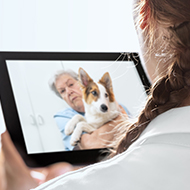PDSA marks one million remote appointments

PDSA currently provides over 2,000 remote consultations every single day.
PSDA has announced that it has provided people in need with over one million remote veterinary consultations since March 2020.
The charity introduced a remote appointment system after the impact of lockdown left several veterinary practices offering only essential and emergency services, with the aim to provide vital services while restrictions remained in place.
Steve Howard, head of clinical services at PDSA, commented on the milestone: “Within just two weeks, the proportion of remote consultations compared to face-to-face went from around 15 percent to an astonishing 80 percent.
“We have now delivered an astounding one million remote consultations since March 2020, giving us the space and time needed to keep our clients and staff safe while continuing to provide almost 300,000 face-to-face consultations for pets in the most urgent need of emergency, life-saving care.”
The charity, which offers veterinary consultation and treatment to those without the financial ability to see a vet, also thanks the RCVS for its remote prescribing ability, which it created to help practices continue their vital work throughout the pandemic. PSDA calls the ability to remotely prescribe as 'critical' to their work over lockdown.
Now that the charity has hit this significant milestone in remote appointments, it doesn't plan on stopping the initiative soon. Steve added: “The benefits of remote consultations extend beyond the pandemic, removing barriers owners may face when accessing veterinary care, whether that be transport difficulties or patient stress in the practice.
“We anticipate remote consultations will continue to be an important part of our work in the future, giving more opportunities for flexible ways to work, whilst also helping us to make our charitable service as accessible as possible to eligible clients and ensuring we can continue to deliver our vital veterinary services to those that need us most.”



 The latest
The latest